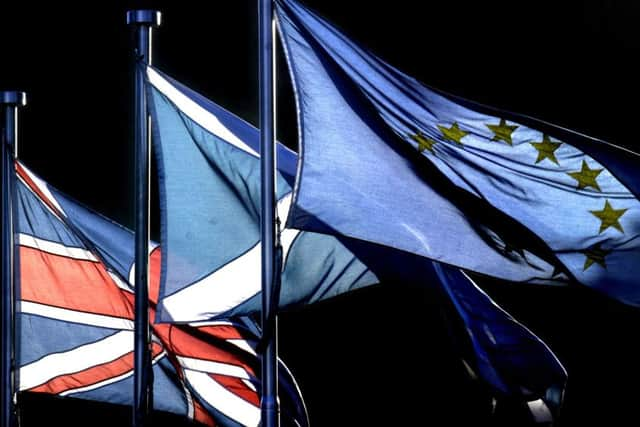Brexit: What happens if Britain leaves the EU with no deal?
The UK faces crashing out without a deal if the bloc rejects its plans.
In fact, hardcore Brexiteers in Conservative ranks are increasingly saying a “no deal” Brexit would be better than a soft Brexit.
Advertisement
Hide AdAdvertisement
Hide AdSo possible is the outcome that both the UK and the EU have issued guidance on their preparations for a no deal scenario.


What is a ‘no deal’ Brexit?
A “no deal” Brexit does what it says on the tin. It means the UK and the EU would be unable to reach a withdrawal agreement.
If no agreement can be made, it means there would be no 21-month transition period, which Theresa May is currently proposing.
If that was the case, consumers, businesses and public bodies would have to respond immediately to changes as result of leaving the EU.
“On 29 March next year, the UK would leave the EU and everything associated with that would come to an end,” says Dr Simon Usherwood, a reader in politics at the University of Surrey.
“[A no deal] doesn’t stop the UK leaving but it means there is absolutely no clarity about what happens.”
While it is a possibility, in reality neither the UK nor the EU would favour a no deal because it signals a poor political relationship, he adds.
One of the key issues with a no deal scenario is the uncertainty it would lead to for life and work in Britain.
So what would actually happen with no deal?
Trade
Advertisement
Hide AdAdvertisement
Hide AdThe UK would revert to World Trade Organisation rules on trade.
While Britain would no longer be bound by EU rules, it would have to face the EU’s external tariffs. The price of goods in shops for Britons could go up as businesses would have to place tariffs on goods imported from the EU. Some British-made products may be rejected by the EU as new authorisation and certification might be required. Manufacturers could move their operations to the EU to avoid delays in components coming across the border.
People
The UK would be free to set its own controls on immigration by EU nationals and the bloc could do the same for Britons. There could be long delays at borders if passport and customs checks are heightened. The fate of expats – there are 1.3 million Britons in EU countries and 3.7 million Europeans in Britain – in terms of their rights to live and work would be unclear.
Professionals working in the EU might find their qualifications are no longer recognised, meaning they are no longer able to practice. Flights to the EU could be grounded as the necessary safety confirmations to cover both ends of the journey might not be in place.
Laws
Relevant EU laws would be transferred over so there would be no black holes in Britain’s lawbook. Britain would no longer have to adhere to the rulings of the European Court of Justice but it would be bound to the European Court of Human Rights, a non-EU body.
Money
The Government would not have to pay the annual £13 billion contribution to the EU budget. However Britain would lose out on some EU subsidies – the Common Agricultural Policy gives £3 billion to farmers.
The Irish border
The issue of the border between Northern Ireland and the Republic would remain unresolved. While physical infrastructure has been vetoed, the border would become an external frontier for the EU in the event of a no deal Brexit.
There would be pressure to enforce customs and immigration controls.
Advertisement
Hide AdAdvertisement
Hide AdWould UK be able to broker trade agreements with other countries?
The current deal on the table would allow Britain to start trade negotiations with other countries after 29 March 2019 but any deals would not be implemented until after the transition period of 21 months.
With a no deal, Britain could implement the deals whenever the fine print is ready.
But deals take years, not months or weeks, to broker.
Therefore the UK is not gaining anything by having no transition period in this instance. “It’s worth making the point that trade deals are about agreements with states. If the UK left without a deal showing it was unable to have constructive conversations with close trading partners [the EU], it would not be a great incentive for third parties,” says Dr Usherwood.
This story first featured on our sister site the i.
